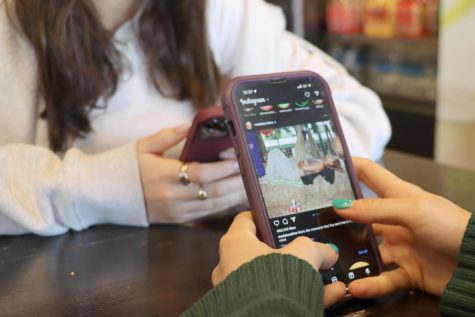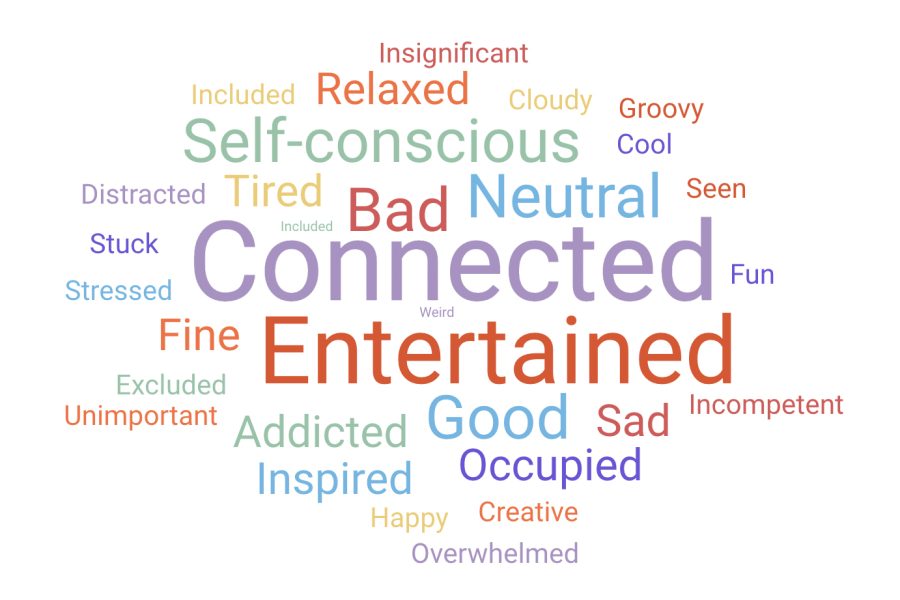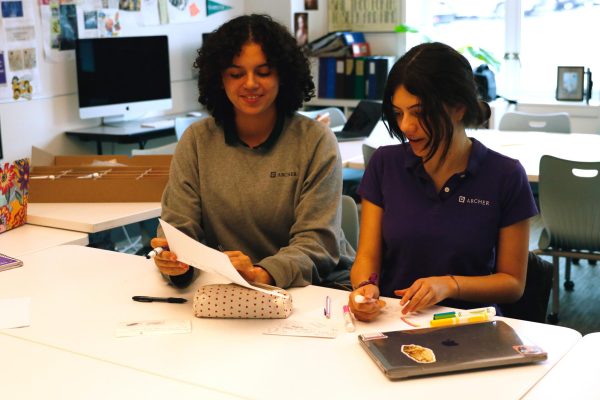Self-love and social media: Teen girls navigate their lives on, off the internet
Photo credit: Tavi Memoli
This WordCloud illustrates the results of a survey about teenage girls’ self-esteem where Archer students were asked to describe how social media makes them feel in one word. Social media has both positive and negative effects on teen girls, specifically on their body image and mental health. (Graphic Illustration by Tavi Memoli)
Connected, entertained, self conscious and addicted. These are only a few words mentioned by 48 Archer upper and middle school students who were surveyed on how social media makes them feel. Social media and posting has been a substantial source of communication and connection for teenage girls, while simultaneously impacting their mental health, self-worth and body image.
Dolly Klock is the founder of Adolessons, where she consults parents, teens and tweens on topics surrounding adolescent health and behavior. She graduated medical school in 1998 and later attended UCLA, Albany Medical College and Brown University. She has been a family medicine physician for 25 years. Klock discussed how posting on social media can impact girls’ self-esteem and affect their choices in the real world.
“From my interactions with teens, people put a lot of effort into their posts and thinking about what they’re going to post. It even changes activities and where they are going,” Klock said. “It changes their experiences while they’re out in the world — even with friends — because they’re thinking about the post instead of just having that experience. This is not just teens; adults do this too.”
Klock said the impact of social media on girls’ lives outside of technology stems from the pressure girls feel to be perceived a certain way on social media. The comment and like features on many social media platforms are how consumers can visually understand how people view their posts.
The Pew Research Center conducted a survey asking teens which social media platforms they use the most, and according to the data collected, “YouTube stands out as the most common online platform teens use out of the platforms measured, with 95% saying they ever use this site or app. Majorities also say they use TikTok (67%), Instagram (62%) and Snapchat (59%).” Youtube, TikTok and Instagram all have like and comment features that tend to create addiction to validation in teens.
“I hear about a sense of pressure in terms of putting your best face forward and making sure you look or dress the right way or that the angle is right. Is it telling the story that you want it to tell? There’s nothing wrong with any of that, but it is time and energy,” Klock said. “It depends on the person, but some people spend a lot of time checking to see how it is being received and if they are getting a lot of likes once it’s out there.”

Sophia Shin is a sophomore at Archer and uses the platforms TikTok and Instagram. She said the constant representation of certain beauty standards can be daunting and has impacted her mental health and self-esteem.
“I feel reliant on it, and it’s constantly trying to give you a certain image especially about body and lifestyle. It’s hard to block it out a lot of the time,” Shin said.
Researchers Ulrich Orth and Richard W. Robins evaluated data on the benefits of having high self-esteem. According to the American Psychological Association, the positive impacts of high self-esteem include “better social relationships, more success at school and work, better mental and physical health and less antisocial behavior.”
In order to achieve high self-esteem, school counselor Jaime MacDonald said it is important to be aware and in control of the type of media one consumes. She has worked as a school counselor at Archer for four years, supporting middle and upper school students with general social, emotional wellbeing. She said posting with certain intentions plays a large part in how teen girls receive likes and comments on their social media posts.
“If your intention is to pose a particular image of yourself, and you get positive feedback about it, that can have a positive impact on your self-esteem. If your intention is to display a particular persona of yourself, and you get negative feedback, that can have a negative impact on your self-esteem,” MacDonald said. “It really depends on what your intention is and the feedback that you get from the post.”
Sophomore at Brentwood School Sadie Abraham said she uses TikTok, Snapchat, Instagram and YouTube. She said social media has affected her wellbeing and self-esteem in both positive and negative ways.
“I use social media because a lot of the time, it’s easy to be an escape just from stress from school, sports, anything, and it’s also my way of communicating with my friends,” Abraham said.
While like and comment features can be convenient ways to show appreciation and share thoughts on a post, they can lead girls to compare their own life to the lives of others. To help illustrate how social media can cause girls to compare their posts’ analytics to those of others, Klock provided an example of this process and how it can negatively impact teen girls’ self-esteem.
“Say I just posted this picture of myself at the beach and my friend that I was with also posted a picture — maybe even the same picture at the same beach, at the same time — but we have different numbers of followers and different people following us,” Klock said. “If one photo gets a ton of likes and the other one does not, what does that mean? There’s so much comparison that happens. Not everyone’s fixated on that, but it is something that happens that’s worth thinking about.”
In the audio clip below, Dolly Klock talks about how teens spend a great amount of time and energy on their posts in an effort to create a socially acceptable internet persona.
To avoid feelings of insecurity or distress from these features, Klock’s advice to young female consumers of social media is to follow accounts that make them feel uplifted rather than accounts that spark feelings of jealousy or comparison.
“If you’re following accounts that are making you feel badly about yourself and it’s affecting your body image or your emotional state, that’s something you have control over,” Klock said. “Find accounts that make you feel good and you’ll find that the more you spend on those, the more the algorithm will send you more of that feel-good [media]. We can use those messed up algorithms to our advantage, too.”
Sophomore at Windward School Eve Finger uses Instagram, TikTok, Facebook and Snapchat. When considering the impact of social media on her self-esteem, she said she finds the platforms to be entertaining and a helpful resource for communicating with friends and to pass time.
“Honestly, I don’t think [social media] has affected me very much. I don’t really find myself comparing myself to other people on social media,” Finger said. “I think that’s also because I’ve heard a lot about how easy it is to do that, so I’m conscious about not doing it.”
On the other hand, Abraham said it has been harmful to her self-image due to the expectation of perfection that many users feel pressure to conform to on these platforms.
“Social media has definitely had a negative impact on my self image and my mental health regardless of how much I use it and how much I say it’s a distraction,” Abraham said. “I find myself looking at people and the perfect parts of their life that they post and I find myself wishing either that was me or I looked a certain way.”
According to MacDonald, it is important to understand how algorithms use the information users put into their accounts because it allows consumers to be in control of their feed and therefore its impact on their self-esteem.
“Social media, like any media, can be an amazing tool. It’s super important to be a responsible consumer of all media, not just social media, and have some awareness about its impact on you,” MacDonald said. “I’ve learned that not everyone, not every adolescent girl in particular, is as aware of the impact that social media has on them, but I think we are definitely doing a better job now at raising that awareness so that people can be responsible consumers.”

Tavi Memoli joined The Oracle as a staff reporter in 2022 and is now returning as a senior reporter in 2023. She plays indoor and beach volleyball and...









